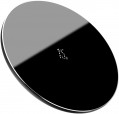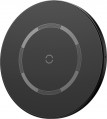Way of mounting a smartphone on a charger.
It's the car chargers that are mainly equipped with smartphone mounts. Many of them also play the role of a holder that allows you to fix the gadget on the dashboard. However, there are also home chargers with this feature. In automotive models, the main methods of fastening are manual
clamp,
proximity sensor(touch clamp),
magnetic retainer and
gravity mechanism. And in household models there is also a special kind of magnetic latches —
MagSafe. Here is a description of each of these options:
— Clamp. The simplest mechanical lock: two spring-loaded jaws that compress the device from the sides. The compatibility of "mechanics" with a specific phone is limited only by the size of the case; at the same time, the design of the spring jaws itself allows you to adjust the width within certain limits, and in some models, additional adjustment in width is also provided. Thus, the clips are compatible with numerous gadgets, while they are very simple and inexpensive. The disadvantages of this option include a somewhat lower reliability than, for example, in gravitational devices: the apparatus located in a conventional clamp, usually, is not supported by anything from below.
— Gravity clamp. A latch of this type covers the smartphone on the sides and
...bottom, while the bottom support works as a trigger sensor: when it goes down under the weight of the gadget, the side jaws converge and compress the device from the sides. Accordingly, to remove the smartphone, you need to slightly lift it. Compatibility in such clamps is also limited only by the size of the device; at the same time, they are noticeably more reliable than conventional clamps, and they are somewhat easier to use, which is why they are more common.
— Magnet. Holder in the form of a strong permanent magnet. Such clamps are very easy to use, they are reliable and durable (there are no moving parts in the design); in addition, they have no restrictions on the size of the rechargeable gadget. On the other hand, two other restrictions are relevant for magnets — by weight (it should not be too big) and by materials (not every case, even a metal one, can be effectively magnetized). And although these points are taken into account in many devices with wireless charging, however, the possibility of using it with a specific smartphone (and especially a massive tablet) should be specified separately.
— Proximity sensor (touch clamp). Automatic latch with an electronic sensor that recognizes the proximity of the gadget or the user's hand. “On the way”, the jaws of the latch diverge by themselves, and when the device is installed, they are compressed; when the smartphone is removed, respectively, the clip reacts to the user's hand and disables the fixation. Such holders are very convenient, but relatively complex and expensive; In addition, the mechanism needs power to operate.
— Magnetic MagSafe. The latch used in chargers for the latest versions of the Apple iPhone. It is a magnetic disk that is attached to the back of the smartphone. The original proprietary charger with MagSafe has a very simple design — a disk with a cable connected to it. However, even this design provides additional convenience: by turning the disk, you can place the wire on the side of the device where it will not interfere when held in your hands. This allows you to conveniently use your smartphone (for example, play games) while charging. There are other varieties of MagSafe chargers available, including third-party brands; there are still relatively few such devices, but in the near future we can expect a change in the situation.The length of the cable supplied with or included with the charger. For wireless models, the length of the power cable of the charger itself is indicated here, for wired models, the length of the cord for charging gadgets
Anyway, a longer cable gives more freedom of movement, but it creates inconvenience for short distances. Also note that charging is supposed to be used in the immediate vicinity of sockets, so wires longer than 2 m are practically not found among such devices. A length of
more than 1.5 m is considered significant, from 1 to 1.5 m — medium, from 0.5 to 1 m — small, and in some models there are wires shorter than 0.5 m.

